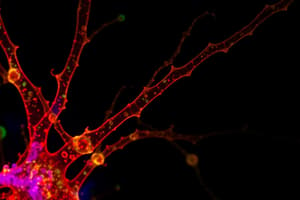Podcast
Questions and Answers
What is the main goal of conformal radiotherapy?
What is the main goal of conformal radiotherapy?
- Eliminate the need for imaging techniques
- Reduce side effects of radiotherapy completely
- Increase tumor control probability while limiting normal tissue damage (correct)
- Use the highest dose possible on all tissues
Which imaging technique is NOT used for target localization in conformal radiotherapy?
Which imaging technique is NOT used for target localization in conformal radiotherapy?
- Magnetic resonance imaging (MRI)
- Single photon emission tomography (SPECT)
- Echocardiography (correct)
- Positron emission tomography (PET)
What is the first step in the treatment planning process for 3-D conformal radiotherapy?
What is the first step in the treatment planning process for 3-D conformal radiotherapy?
- Design of radiation fields
- Optimization of the treatment plan
- Determination of the planning target volume (PTV)
- Acquisition of anatomic information (correct)
What feature distinguishes microMLCs from standard MLCs?
What feature distinguishes microMLCs from standard MLCs?
Which step involves contouring the planning target volume (PTV)?
Which step involves contouring the planning target volume (PTV)?
What is one use of the leafs in modern linacs equipped with MLCs?
What is one use of the leafs in modern linacs equipped with MLCs?
Which imaging method provides functional information in target localization?
Which imaging method provides functional information in target localization?
Which of the following does NOT represent a goal of modern conformal radiotherapy?
Which of the following does NOT represent a goal of modern conformal radiotherapy?
What is primarily used for shaping irregular radiation fields less than 10 cm?
What is primarily used for shaping irregular radiation fields less than 10 cm?
What is the purpose of the beam’s-eye-view option in treatment planning software?
What is the purpose of the beam’s-eye-view option in treatment planning software?
What is the goal of conformal radiotherapy?
What is the goal of conformal radiotherapy?
Which imaging technique is primarily used for anatomical localization?
Which imaging technique is primarily used for anatomical localization?
Which step is NOT part of the treatment planning process for 3-D conformal radiotherapy?
Which step is NOT part of the treatment planning process for 3-D conformal radiotherapy?
What feature distinguishes the use of microMLCs in radiotherapy?
What feature distinguishes the use of microMLCs in radiotherapy?
Which imaging method provides anatomical information necessary for determining the PTV?
Which imaging method provides anatomical information necessary for determining the PTV?
What is the primary role of MLCs in modern linacs?
What is the primary role of MLCs in modern linacs?
Which functional imaging technique is used in the target localization process?
Which functional imaging technique is used in the target localization process?
Which statement is false regarding the optimization of the treatment plan?
Which statement is false regarding the optimization of the treatment plan?
Which of the following imaging techniques is used for functional imaging?
Which of the following imaging techniques is used for functional imaging?
Which step involves using the beam’s-eye-view option?
Which step involves using the beam’s-eye-view option?
Flashcards are hidden until you start studying
Study Notes
Basics of Conformal Radiotherapy
- Enhances treatment outcomes compared to traditional dose delivery by optimizing tumor control probability while minimizing normal tissue damage.
- Shapes the prescription dose volume to align with the planning target volume (PTV) and limits dose to organs at risk below tolerance levels.
Target Localization Methods
- Utilizes anatomical imaging techniques, including:
- Computerized tomography (CT)
- Magnetic resonance imaging (MRI)
- Single photon emission tomography (SPECT)
- Ultrasound (US)
- Employs functional imaging approaches, such as:
- Positron emission tomography (PET)
- Functional magnetic resonance imaging (fMRI)
- Molecular imaging
Treatment Planning Process for 3-D Conformal Radiotherapy (CRT)
- Involves a four-step procedure:
- Acquisition of transverse (axial) images for anatomical information.
- Segmentation process to contour the PTV on each axial image by the radiation oncologist.
- Designing radiation fields through beam’s-eye-view options in treatment planning software.
- Optimizing the treatment plan by adjusting field sizes, beam directions, and energies.
Modern Linear Accelerators (Linacs)
- Equipped with Multi-Leaf Collimators (MLCs) with 20 to 60 pairs of tapered tungsten leaves.
- Each leaf typically projects a width of 5 to 10 mm at the linac isocenter.
- MicroMLCs, with widths less than 5 mm, are specifically used for:
- Shaping irregular fields under 10 cm for areas like head and neck.
- Creating irregular fields below 3 cm for radiosurgery applications.
Basics of Conformal Radiotherapy
- Enhances treatment outcomes compared to traditional dose delivery by optimizing tumor control probability while minimizing normal tissue damage.
- Shapes the prescription dose volume to align with the planning target volume (PTV) and limits dose to organs at risk below tolerance levels.
Target Localization Methods
- Utilizes anatomical imaging techniques, including:
- Computerized tomography (CT)
- Magnetic resonance imaging (MRI)
- Single photon emission tomography (SPECT)
- Ultrasound (US)
- Employs functional imaging approaches, such as:
- Positron emission tomography (PET)
- Functional magnetic resonance imaging (fMRI)
- Molecular imaging
Treatment Planning Process for 3-D Conformal Radiotherapy (CRT)
- Involves a four-step procedure:
- Acquisition of transverse (axial) images for anatomical information.
- Segmentation process to contour the PTV on each axial image by the radiation oncologist.
- Designing radiation fields through beam’s-eye-view options in treatment planning software.
- Optimizing the treatment plan by adjusting field sizes, beam directions, and energies.
Modern Linear Accelerators (Linacs)
- Equipped with Multi-Leaf Collimators (MLCs) with 20 to 60 pairs of tapered tungsten leaves.
- Each leaf typically projects a width of 5 to 10 mm at the linac isocenter.
- MicroMLCs, with widths less than 5 mm, are specifically used for:
- Shaping irregular fields under 10 cm for areas like head and neck.
- Creating irregular fields below 3 cm for radiosurgery applications.
Studying That Suits You
Use AI to generate personalized quizzes and flashcards to suit your learning preferences.




